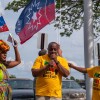When the buses rolled, neighborhoods were war zones and children fodder. When the buses rolled, weapons were rocks and spit and taunts.
When the buses rolled, some shouted “never”, others demanded, “right now.”
Forty years ago this week, the first buses assigned under the city’s desegregation plan rolled out onto the streets of Boston.
It took an NAACP lawsuit, and a federal ruling, and years of protest by black parents to make it happen. District Judge Arthur Garrity ruled on the plan’s implementation in June 1974. Just 12 weeks later, black and white students were bused outside their neighborhoods and transported into a new chapter in the city’s history.
It was only a matter of time before hysteria and passion burst open festering racial wounds — antibusing advocates screaming “white rights” led a mob of Irish Bostonians in chasing revered Sen. Ted Kennedy, attackers wielding a flag pole in an attempted stabbing of African-American Ted Landsmark on City Hall plaza, a black passing motorist nearly pummeled to death after being pulled from his car, and a white student stabbed in retaliation. All extraordinary events unfolding in the harsh glare of a national spotlight. Boston was no longer the city where noble blood was shed for our nation’s liberty, but a place marked by the ignoble stain of prejudice.
Louise Day Hicks, then Boston School Committee chair, had famously argued, “a racially imbalanced school is not educationally harmful.” But in black schools across the city there was evidence of Dickensian conditions — outdated or tattered books, or no books, no science labs, crumbling buildings, and a shortage of skilled teachers.
“It’s not fair to me,” one little Roxbury girl told a TV interviewer in 1974. She matter-of-factly told him she expected to get stoned when she rode the bus. Her words echo across time, a rebuke to failed leadership.
Now four decades later, we reflect on an anniversary some know nothing about, some would like to forget, and others dismiss as a social engineering experiment. As the adage goes, those who don’t know their history are doomed to repeat it. Four months ago City Councilors Bill Linehan, Stephen Murphy and Sal LaMattina demonstrated long held antibusing sentiment by voting present on a resolution to recognize the importance of Brown versus the Board of Education, ignorantly conflating the national school desegregation law, with the desegregation crisis in Boston. Their vote is a reminder that true change is never easy, and that time alone cannot make a difference.
But, in a town where there were once no black members of the school committee, Mayor Marty Walsh has just named Rahn Dorsey, an African-American, as Chief of Education for the City of Boston, a cabinet level position.
It’s 2014 and it’s a ‘new’ Boston, yet this most important history casts a hulking shadow over the city’s shiny new image. Only by embracing this painful legacy can this 40th anniversary be something more than a date on a calendar.
“There is no point in bringing up history,” says Boston City Councilor Tito Jackson, "unless we are going to do something about it.”
Callie Crossley is the host of Under the Radar with Callie Crossley.




